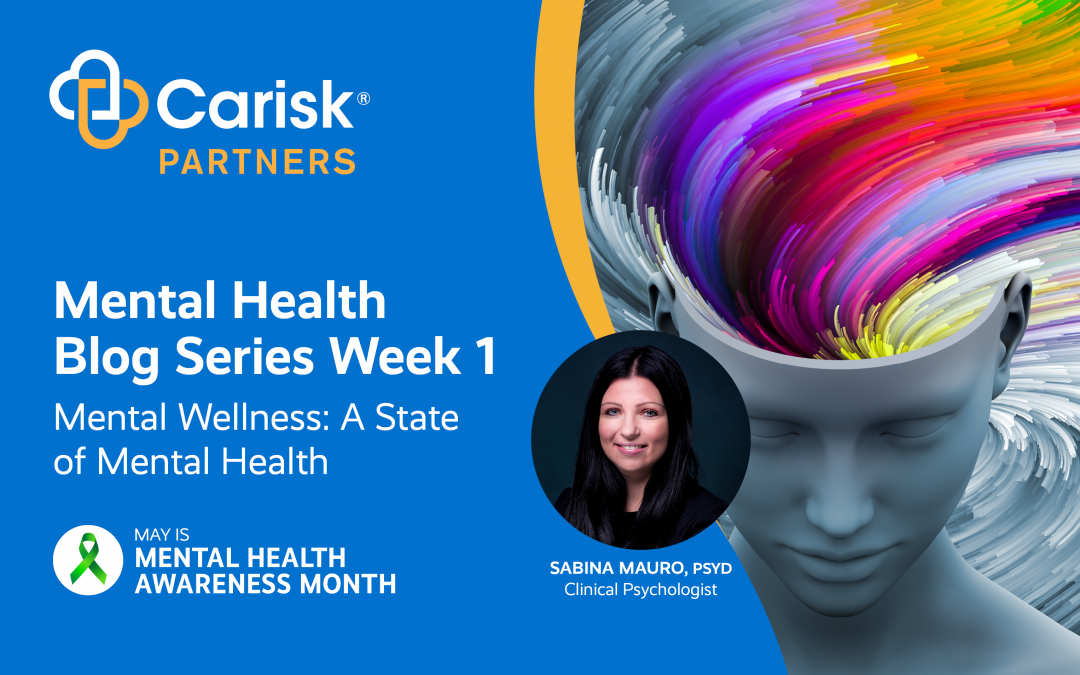Mental Health Awareness Month | Week 1 Blog by Dr. Sabina Mauro
With the current world population estimated to be 8.2 billion, everyone contributes their uniqueness to what makes the fabric of the world. While we maintain a vast amount of uniqueness between individuals, it is said that we have more in common than differences. One universal factor that exists within us is mental health. Within mental health is a state known as mental wellness.
Mental wellness is the positive aspects of mental health that are achieved through awareness, action, acceptance, and availability. Mental wellness enhances resiliency, offers new perspectives, and improves our overall quality of life.
Mental wellness can be influenced by many factors, both internal and external, including and not limited to:
- Brain health: A healthy brain is beneficial for mental wellness. Brain health can be impacted by injury to the brain (e.g. traumatic brain injury), imbalances of neurotransmitters (e.g. dopamine), and overall structure of the brain. At the same time, our brain’s neuroplasticity, its ability to adapt and change, provides us with a chance to continuously improve mental health.
- Life experiences: Positive life experiences contribute to mental wellness. Because our life experiences profoundly shape our mental health, adverse childhood upbringing, loss of a loved ones, and unsettling medical diagnoses can make us vulnerable to mental health illnesses. However, positive and fulfilling experiences such as graduating from college, starting a family, and achieving recognition for hard work fosters higher levels of mental wellness.
- Stress: Stress is a natural response that has helped us evolve to thrive. Exposure to chronic stress causes excessive stress hormone to be continuously released, which disrupts the nervous system functioning. Conversely, a healthy dose of eustress such as exercise or starting a family can helps build our resiliency and prepare us to deal with acute stress.
- Religion/spirituality: Positive spiritual experiences can provide us with a sense of belonging. Extreme religious beliefs and practices can lead to the stigma of mental health issues due to lack of faith, sin, or punishment. Nevertheless, religion and spirituality can improve mental wellness through finding solace, purpose, and support network of faith based individuals.
- Genetics: Understanding how epigenetics can influence gene expression can change the trajectory of mental wellness. Its often believed that “mental health” genes can contribute to mental health vulnerability, increasing our likelihood for a mental health diagnoses and illnesses. However there is a growing body of evidence that also shows that the “mental health” genes can be altered through environmental factors, such as living healthy lifestyles, allowing us to thrive.
- Support network: A support network is crucial for mental wellness. A limited support network can lead to isolation and alienation, a myopic perspective, and limit the understanding of available resources. A strong and healthy support network enhances mental wellness by creating deep and meaningful connections, exposure to diverse viewpoints, and enhancing coping mechanism for stressful situations.
Mental health is a complex interplay of factors that are not fixed. Understanding how we as individuals react to this complex interplay of factors provides us with the opportunity to strengthen our mental health and intentionally migrate to a state of mental wellness.
Lets reflect for a moment on the factors listed above and bring awareness to our mental wellness. Which of these factors resonate? Which factors come to mind that may not be listed and why are they important to us?
Stay tuned to learn what happens when we take action to strive toward mental wellness!





